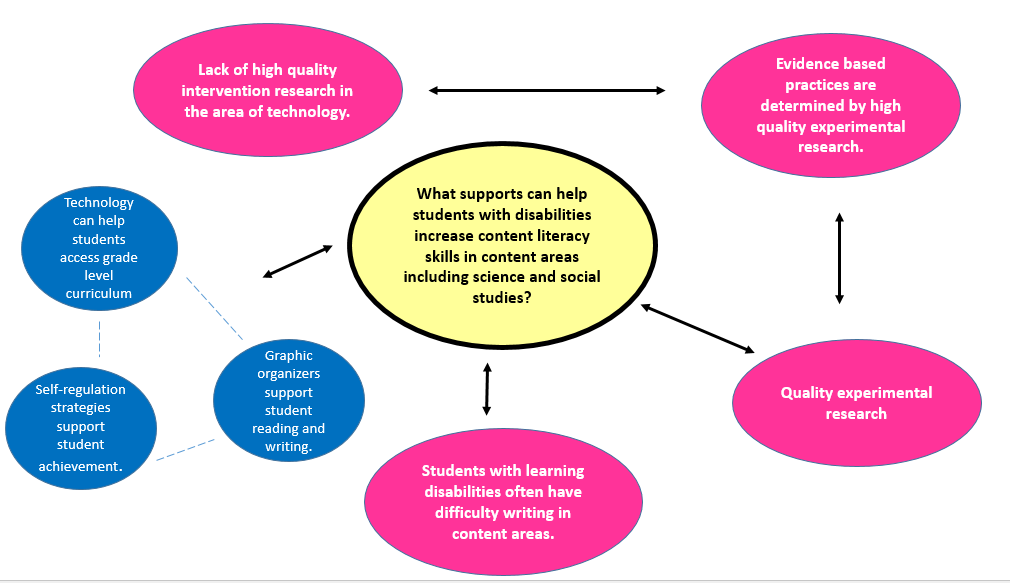Portfolio 2: Knowledge Representation Essay
My research interest in special education is in intervention research, specifically technology supports combined with specific strategies to help students with learning disabilities access grade level content area curriculum. Because students with high incidence disabilities are required to make progress towards grade level curriculum, and students in this population often have difficulty accessing and making progress towards the standards (NCES, 2013), I am interested in developing effective interventions that could be easily implemented within classroom settings. My current interest is specifically in technology based interventions that supports the expository writing of students with disabilities in grade level content areas.
Although students with high incidence disabilities are required to write within their core academic classes, many students have difficulty composing persuasive, narrative, and expository essays (Koutsoftas & Gray, 2012). Despite of this difficulty, there is a limited amount of time spent on explicit writing instruction in elementary, middle, and high school (Cutler & Graham, 2008) leading to students with high incident disabilities who are not proficient in writing (NCLB, 2001). Currently, approximately ninety-five percent of students with disabilities do not acquire the writing skills needed to be successful in school (Graham, Herbert & Harris, 2011). However, increased time in writing instruction is related to an increase of various writing skills, including number of words and essay parts (Graham et.al, 2012). In addition to increased writing instruction, technology, graphic organizers, and self-regulation strategies have been pinpointed as supports that can support student writing in a variety of genres (Peterson-Karlan, 2011). A combination of strategies, including self-regulation and computer based graphic organizers, may help students with high incidence disabilities have increased writing ability within a variety of measures in content areas. According to a Graham and Harris’s review of writing research (2011), the researchers stated that self-regulation can help students manage their writing behaviors, which can positively support the students ability to write in a variety of formats. In addition, although most graphic organizer research is in the area of comprehension, graphic organizers can help students reduce their cognitive load, which could support their writing.
To determine interventions that can support student writing in the content area, high quality experimental research, either group experimental or single subject research, is required. High quality experimental research will help to rule out alternative hypothesis and help to determine if the intervention caused the change in student writing behaviors. High quality research encompasses quality indicators that help to determine if the change in behavior is due to the intervention (Gersten, et al., 2005) Although experimental research will be helpful in determining the magnitude of change, the addition of qualitative data would be useful in gaining student perspectives. A mixed-methods research study would help to study the variables as well as the process of writing. In determining the impact of the intervention on student writing through the use of a mixed-methods research study, structured interviews and observational data could help to determine the parts of the intervention which supported student writing in addition to gaining a deeper understanding of the student’s process of writing while utilizing the intervention. The qualitative data would be useful in analyzing the quantitative results, as the process of using the intervention revealed in the qualitative data could help to explain the magnitude of the results.
References
Cutler, L., & Graham, S. (2008). Primary grade writing instruction: A national survey. Journal of Educational Psychology,100, 907-919. doi: 10.1037
Peterson-Karlan, G. R. (2011). Technology to support writing by students with learning and academic disabilities: Recent research trends and findings. Assistive Technology and Writing, 7(1), 39-62.
Gersten, R., Fuchs, L. S., Compton, D., Coyne, M., Greenwood, C., & Innocenti, M. S. (2005). Quality Indicators for Group Experimental and Quasi-Experimental Research in Special Education. Exceptional Children, 71(2), 149-164
Graham, S., Harris, K., and Hebert, M. A. (2011). Informing writing: The benefits of formative assessment. A Carnegie Corporation Time to Act report. Washington, DC: Alliance for Excellent Education.
Koutsoftas, A., & Gray, S. (2012). Comparison of narrative and expository writing in students with and without language-learning disabilities. Language, Speech, and Hearing Services in Schools, 43, 395-409.

